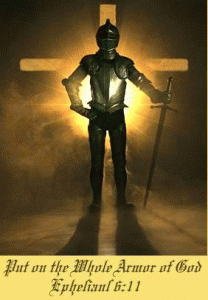 Scripture commands us to “always be ready to give a defense to everyone who asks you to give a reason for the hope that is in you…” (1 Peter 3:15) To give a defense is to give a reasoned explanation for the things we believe, I think it is always a good thing for him to seek to sharpen his skills. In learning there was an apologetics course taking place in a Bible College locally (some time back), I signed up for the class, not to gain credit, but for the practical benefits of the study. The course was a very enriching experience for me. Though in many ways it was similar to one I took more than 20 years before, I gained far more from the course this time through. Perhaps that’s because my experience as a pastor allows me to now understand just how relevant the material is to help reach people in our day.
Scripture commands us to “always be ready to give a defense to everyone who asks you to give a reason for the hope that is in you…” (1 Peter 3:15) To give a defense is to give a reasoned explanation for the things we believe, I think it is always a good thing for him to seek to sharpen his skills. In learning there was an apologetics course taking place in a Bible College locally (some time back), I signed up for the class, not to gain credit, but for the practical benefits of the study. The course was a very enriching experience for me. Though in many ways it was similar to one I took more than 20 years before, I gained far more from the course this time through. Perhaps that’s because my experience as a pastor allows me to now understand just how relevant the material is to help reach people in our day.
One of the tasks we as students had was to imagine someone who had sat under our ministry for some time who had now gone to a secular College or University, and was now feeling fragile in their faith after reading Bertrand Russell’s book, “Why I am not a Christian.” Our first task was to actually read Russell’s book and then respond to an imaginary letter from this person who was now questioning the claims of Christ. I chose the name Tony for this man… here’s what I wrote:
Dear Tony,
It was a pleasure to hear from you and I am glad that things are going well for you in your studies.
I would like to respond to you regarding your very real concerns about your Christian faith after reading Bertrand Russell’s essay, “Why I Am Not a Christian.” You said that you felt your faith had been “seriously violated” and was very much “under fire.”
Since talking to you, I have read through Russell’s essay a number of times. Russell had undoubted intelligence, but I do have to say that I found his arguments, upon close examination, to have very little weight. Let me explain.
The first thing I would point out is Russell’s obvious bias against Christianity. I was amazed to read his statement, “Historically it is quite doubtful whether Christ ever existed at all, and if He did we do not know anything about Him.” To make this statement, Russell portrays a predisposition against the facts, or in other words, a great bias. He dismisses, in one breath, the entirety of the New Testament Gospels, which were written by eye witnesses concerning the events they described. These eye witnesses were also willing to die for the truths they professed. Though many men have died for things that were in fact untrue, I don’t know of anyone who was prepared to die for what they knew to be untrue. Yet these men faced death because of their testimony, but preached the Gospel anyway. (Of course, Luke wrote after ascertaining the facts from eye witnesses – Luke 1:1-4).
Even if we were to ignore the sure testimony of scripture, outside sources certainly establish the historicity of Jesus. As you know Tony, I did an entire lecture on the references to Christ found outside the New Testament, while you were part of the youth group here at the Church. You remember Tony how in that lecture, I also taught that the Gospels were written within a relatively short time span after the time of Jesus’ earthly life, and I am sure you remember that there are so many copies of them still in existence, which adds much weight to the reliability of the texts themselves. The reliability of the New Testament far exceeds any other ancient document.
My charge of Russell being biased is fueled by his statement that he found the very existence of Jesus Christ “quite doubtful.” To take this view, logically, he would also have to doubt every fact we know about ancient history, because there is far greater evidence for the existence of Christ than just about any other person in the ancient world. Russell shows great inconsistency here. I am left to just ponder the obvious bias that Russell had in writing what he did. Russell had a great disdain for religion, especially Christianity.
That said, I do need to respond to Russell’s arguments themselves. Russell had a history of going from one idea to another in his earlier life concerning the nature of reality. It is important to state this to assess the intellectual “platform” that Russell stood on to make his boasts. It is also important to point out that Russell provided no real alternative to the truths he was attacking and died disillusioned, never having achieved what he hoped he could do – establishing a philosophical mathematical world-view that is internally consistent and not circular (i.e. does not require presuppositions).
Russell claimed that Christ was wrong about the timing of His Second Coming into the world. Of course, to answer each of the points he makes in this section of his essay “Defects in Christ’s Teaching” would require a book in itself. Certain background information is foundational to our thinking before we can build a case defending Christ’s words here. Fortunately such a book has been written, and before you left for University I gave you a copy. It is Dr. R.C. Sproul’s book, “The Last Days According to Jesus.” I believe you will find the points Russell brings up answered in this fine volume from page 12 onwards, in the section, “Russell’s Rejection of Christ.” Sproul’s response to Russell here takes on a partial preterist view concerning eschatology; however, whether or not you and I go all the way with Sproul in this, I do believe that Sproul is at least honest in dealing with the objections that Russell raised. Let me know what you make of Sproul’s defense of Christ here.
I must say Tony that I found Russell’s thinking to be very contradictory on a number of issues. For instance, he suggests that our values are not objective, but relative and very fleeting. Yet, Russell presents his values (that we gain autonomously) within a universe that he claims is without values. In other words, he wants us to act as if his arguments actually mean something; that we are to value his values though values do not exist! Yet he does this believing that his values are the absolute evaluation concerning Christ Himself and of Christians! In attacking the claims of Christ, I have to ask the question “upon what moral basis does Russell do so?” In his universe without values, he is giving us his evaluation of Christ!
Tony, I hope you can see that if Russell was consistent he would have to say that his own values were fleeting and doomed to oblivion as well as anyone else’s. He would also have to argue that since values are temporary and have no place in objectivity, there is no need to listen to anything he had to say. Yet, of course, that’s not what he says at all. He certainly wanted us to listen to his values and arguments; indeed he wanted us to adopt them. Here then is inconsistency personified.
It seemed that Russell had a limited time to deal with many issues under the topic at hand. However, he did say enough to make me alarmed. He made definite claims that need to be scrutinized. The first one is that the Roman Catholic Church is wrong to say that we can prove the existence of God by “unaided reason.” He then went on to try to defeat these same arguments… but Tony, isn’t it amazing that Russell tries to destroy these arguments based on unaided reason, by using his own unaided reason? Again, I would have to say that this is bias in the extreme. Russell simply takes it for granted that autonomous reason enables man to know things. But how does he know that? How does he know anything about the “laws” of science, for example?
 He makes a great deal of assumptions without any objective criticism of his own paradigm. If this is a chance universe (as Russell claims) what is the basis for saying that anything in the universe is uniform. In other words, how do we know that science can teach us anything? Russell has no basis, within his own thinking structure to believe that science will continue to bring uniform results. I might mention here that the skeptic David Hume made a devastating critique of this, showing this very point.
He makes a great deal of assumptions without any objective criticism of his own paradigm. If this is a chance universe (as Russell claims) what is the basis for saying that anything in the universe is uniform. In other words, how do we know that science can teach us anything? Russell has no basis, within his own thinking structure to believe that science will continue to bring uniform results. I might mention here that the skeptic David Hume made a devastating critique of this, showing this very point.
Let me give you an example of what I am saying Tony. Though water may have boiled at 100 C in the past, there is no basis whatsoever for Russell to believe that it will do so today or in the future, in this chance driven universe. Yet it is obvious that he would take this (water boiling at 100 C) as a given – a known fact – but my point is that he has no rational basis for doing so within his epistemological system. Though pigs may not have flown in the past, they may well do so if we test one today. The result may be very different today. Who is to say that something random can’t happen right now that changes everything? With this philosophy or world view, it is impossible to have a true knowledge of anything. Though oranges are usually orange in color, they may be green with red spots tomorrow. The point is that in Russell’s random/chance driven universe, nothing can be known with any degree of certainty.
Russell tries to argue based upon the laws of logic. That’s all well and good, but we must understand that these laws are not observable to the senses. Russell needs to face the fact that either these laws are universal, binding and unchanging (as they are in reality), or else they are merely preferences based upon relativism. Russell cannot rationally account for the laws of logic, yet desires to base his arguments upon them. It is only in a universe created and sustained by God that we can account for such things as the laws of logic or science. Russell’s very use of logic presupposes a God who set up those laws, and it is here that we need to press Russell to admit that.
Continued in Part 2
